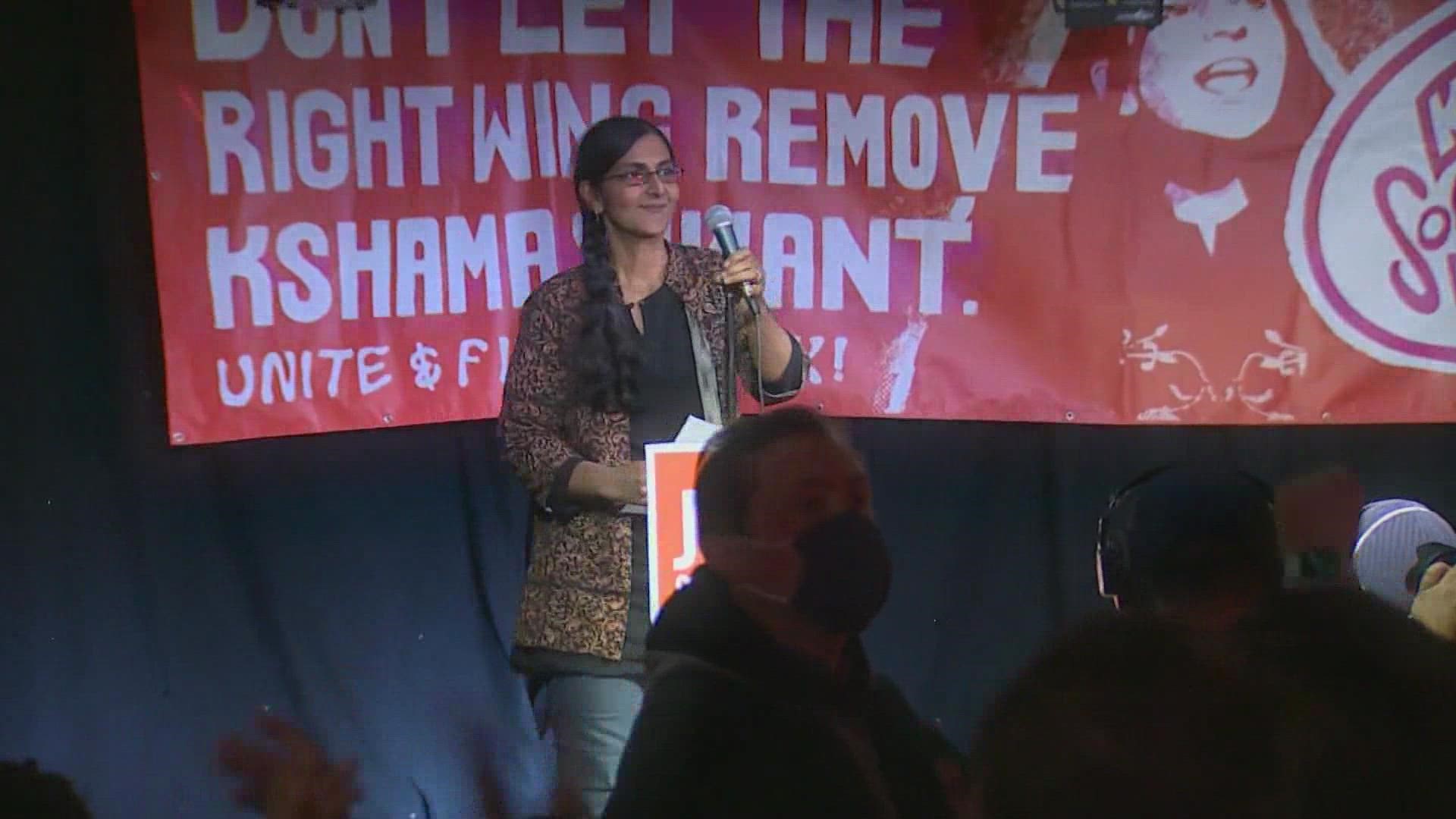RENTON, Wash. — Seattle City Councilmember Kshama Sawant will survive a recall attempt and simultaneously bring new light on what ultimately was an effective and legal method of securing votes.
After final ballots were checked for authenticity Thursday, King County Elections said 20,646 District 3 residents, or 50.37%, voted against recalling Sawant. That is only 306 more residents than the 20,340, or 49.63%, who voted to recall the politically polarizing city council member.
There is no automatic recount for a recall election, and it will be certified on Friday. Recall Sawant Chair Henry Bridger said his campaign will not challenge the results.
"It puts her on notice, and the rest of council on notice, that we won't tolerate this," said Bridger.
Bridger led the effort to recall the three-term council member based on three charges that she violated her oath of office, including using public funds for an initiative campaign, violating public health guidelines with an after-hours protest at Seattle City Hall, and leading a protest match to Mayor Jenny Durkan's home, which violated state privacy laws.
It is fair to say Sawant and her supporters conducted one of the better election ground games in recent memory by utilizing a system most voters don't know about.
"It is legal," said King County Elections Chief Julie Wise, unequivocally, about the pop-up voting sites that Sawant supporters created around Seattle's Capitol Hill.
"We heard this election from about 100 voters that were concerned and I think frustrated," said Wise, in reference to the tents where people were printing ballots for the recall election.
"That's a program that we've offered our voters for over a decade now. Since 2010, voters have been able to go online and access their ballots," said Wise, who believes the print-at-home option enhances access to voting.
Wise said the online platform allows registered voters to replace their ballots and print them at home, putting the ballot in a postage-paid envelope. She said the ballots are held to the same strict standard and verification as ones mailed out by the elections department.
In this particular election, 3% of ballots, or 1,400, were printed. Wise said the normal rate during an election is one-half of one percent. Given the small margin, it is highly likely the ballots printed at pro-Sawant locations were the difference in the race.
Secretary of State spokesperson Kylee Zabel said the print-at-home option is legal statewide and related to the U.S. Military and Overseas Voter Empowerment Act (or MOVE Act) of 2010, which “required states to allow military and overseas voters to obtain their ballot electronically and print it out online.”
Bridger, and others, have raised questions about whether the tactic violated state electioneering laws, saying it needs to be fixed. However, they won't contest the final election results.
"We're not going to challenge it, and we're going to leave it alone," he said.
A statement from Secretary of State Steve Hobbs suggests his office has paid attention to the complaints in Seattle.
"State law prohibits ‘election officers’ from electioneering at any ‘voting center or ballot drop location,'" Hobbs wrote. “Any election officer who does any electioneering at a voting center or ballot drop location during the voting period that begins 18 days before and ends the day of a special election, general election, or primary is guilty of a misdemeanor, and upon conviction must be fined in any sum not exceeding one hundred dollars and pay the costs of prosecution. Since this activity occurred during a local recall election, enforcement of this law would fall to the city police or the county sheriff, then to be followed up on by the city attorney or county prosecuting attorney. Whether this activity is legal would be something for the courts to ultimately determine.”
Wise said there is no violation.
"At those booths, we didn't see any King County Election signs, we didn't see them impersonating that they were the elections department," Wise said, noting the sites were clear campaign locations.
In fact, Wise said she wishes more people knew about the program.
"It's a really important access piece," she told KING 5. "It certainly means and warrants further conversation. I'd look forward to doing that with auditors across the state and legislators this session to see if we need to be changing our laws at all. But what I want to be very careful about is that we don't limit folks that need access to online ballots."

